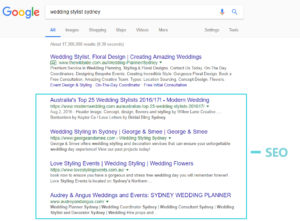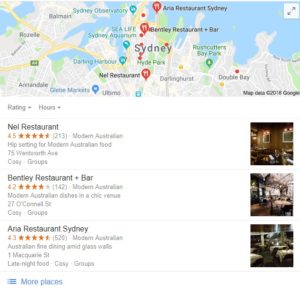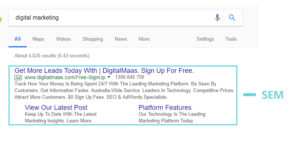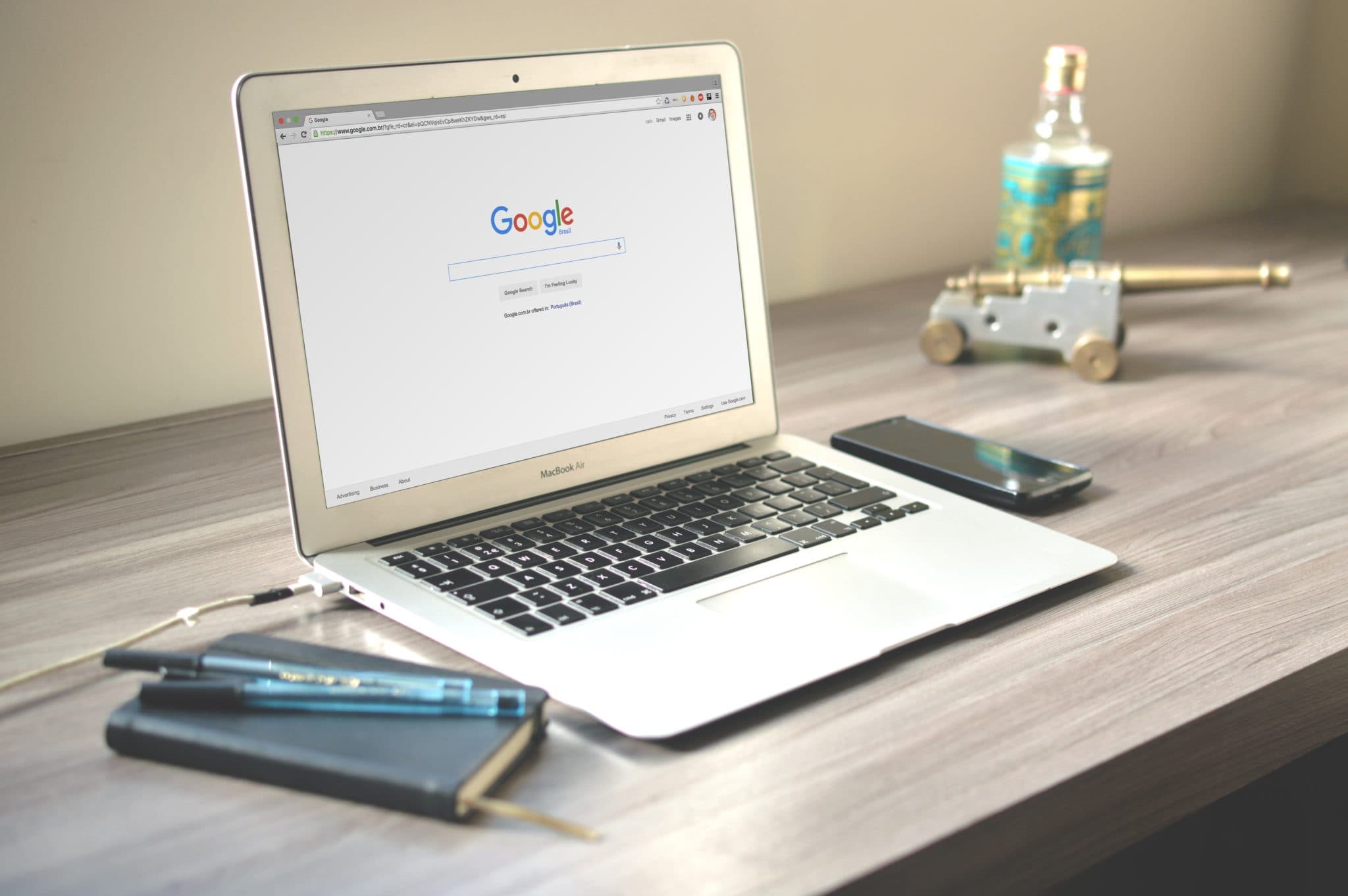In the world of digital marketing, you may have already heard of SEO and SEM (search engine optimisation and search engine marketing). It’s not surprising that these concepts are used interchangeably as they both aim to make your website stand out in the search results and attract more customers. These two, however, are entirely different.
To help you make informed decisions, we shed some light on the difference between SEO and SEM and their key distinctions.
What is SEO?
SEO is the process of optimising your website to acquire free traffic from search engines. By helping search engine crawlers understand your website better, there’s a high chance that you’ll rank higher in the search results.
While the SEO landscape is ever-changing because of the frequent updates made to search engine algorithms, it comes with two main pillars that remain constant: On-Page and Off-Page Optimisation.

On-page SEO
On-page SEO focuses on refining the elements of your website that affect your organic search rankings. This practice includes:
-
- Fast page load speed. Site speed is one of the many ranking factors considered by Google. Pages that are taking too long to load can cause indexation issues because crawlers might miss the page. Additionally, they impair user experience, resulting in higher bounce rates and lower conversion rates.
- Unique and optimised meta data and headlines. Heading & title tags, meta descriptions should incorporate target keywords to make your web pages more relevant and SEO-friendly.
- Quality content. A comprehensive and relevant content can make your website engaging and valuable. The more users find it helpful, the more your chances you’ll rank higher. Make sure it has no duplicates to avoid hurting your rankings.
- Interlinking of pages. Links to other parts of your site not only make it easier for users to navigate your site but also tell search engines which pages are the most significant so they can get better rankings.
- Well-formatted URLs. A simple URL structure helps crawlers to make better sense of your site’s content and purpose.
- Optimised Images. Adding appropriate titles and alt texts not only describe an image to users who are unable to load it, but also help drive more traffic from Google Image Search.
Off-page SEO
Off-page SEO, on the other hand, refers to the activities done outside of your website. It aims to improve your domain authority, so search engines can identify if your site is relevant and trustworthy.
- Link building. Acquiring high-quality backlinks from other relevant websites signals search engine crawlers that your site is a reliable resource worthy of citation. When done properly, you can give your rankings a boost. Always perform an audit to ensure that you don’t have spam backlinks.
- Social sharing signals. The more you gain followers, shares, and likes on social platforms like Facebook and Twitter, the better the impact on your site’s traffic and search rankings.
- And many more!
On-page and off-page SEO work hand in hand to build your website’s online visibility and expand your outreach, so you can increase your leads and conversions. For the best results, we recommend prioritising on-page SEO first to ensure your website meets your customer’s needs and expectations.
Local SEO

Apart from On- and Off-page SEO, you can also keep your business ahead of the competition with Local SEO. This takes a more targeted approach because it helps you connect with prospects who use local search to find businesses near them. While On- and Off-page SEO still play a major role, there are a few differences in the practices you’ll be implementing.
- Google My Business. Claiming and optimising your Google My Business listing can help you win a spot in the search results because it allows you to appear in multiple platforms like Search and Maps. Users can easily access important details about your business, such as your address, contact number, and even client reviews.
- Bing Places Listing. Bing comes second in driving web traffic after Google, that’s why it makes sense to claim a Bing Places listing as well. Similar to Google My Business, it helps you gain more online exposure.
- Local citation. Citations validate your business as part of a community. They not only help strengthen your website’s credibility but also drive up its search engine rankings.
What is SEM?
SEM focuses on garnering website traffic through paid search. It follows an auction and ranking system to determine which ads will appear in front of the searches. To win the best ad placement, however, it’s not enough to offer a high bid. It’s important to enhance and maintain your quality score as well.
SEM is greatly targeted, and using it right will attract customers who are ready to buy from your business. The most popular program for pay-per-click (PPC) advertising is Google AdWords.

I know what you’re thinking – so why would I do SEM if I can just get traffic for free using SEO?
- It’s faster than SEO. SEM can start producing results immediately, while SEO can take months. If done right, you can be on the top of the search engine results page (SERP) for several targeted terms within the day. In turn, you can gain instant visibility and convert the traffic at the best rate possible.
- Connect with customers when it matters. You can show your ads to the right people at the right time using specific keywords, locations, demographics, and more.
- Improve performance.You can tweak your campaign whenever you want to since SEM has the tools that help monitor your audience’s behaviour real-time. Unlike traditional methods, you can make large scale implementations quickly and efficiently.
- Control your costs. SEM is usually more cost-effective than other forms of digital marketing because even with a low investment, it can generate a high conversion rate. You have complete control over how you spend per month, per day, and per ad.
Keyword Management
Keywords serve as the backbone of every SEM campaign. That said, you need to perform a comprehensive research to determine the keywords that your prospects are likely to use when looking for your products and services. Doing so will also steer you clear of negative keywords, or search terms that don’t attract conversions.
Winning the AdWords Auction
Every search engine has its own paid search advertising platform. For Google AdWords, it chooses which ads will appear on the search results based on the following factors:
- Bid. You can change your bid whenever you like. The bid you place will be the maximum amount you’ll pay for every click on your ad, but you can be charged less depending on your quality score.
- Quality of your ads. Your ad and the website it links to should be relevant to the user who’ll see it. With high-quality ads, you can secure better ad positions and reduce your cost-per-click.
- Impact from your ad extensions and other ad formats. You can add more details to your ads, such as your contact number, or more links to certain pages on your site. These are also called ad extensions. AdWords then evaluates how these extensions will contribute to your ad’s efficiency, so you can outrank your competitors.
SEO and SEM: Which is Better for Your Business?
Choosing the right option for your business will depend on your needs. Using SEO alone can take some time to yield results, but it costs less and builds search credibility that you can’t achieve through SEM. Meanwhile, using SEM alone is ideal if you already have good conversion rates but want to get more leads immediately and maximise your profit. SEO and SEM have their own set of practices and benefits, but when combined, they can boost your business growth in the short term.
DigitalMaas is your expert for all things SEO and SEM. We can help you grow your business and stay on top of the competition by using the latest trends and techniques. Feel free to contact us to get started. You can also try our site audit to see how you can further improve your website.



